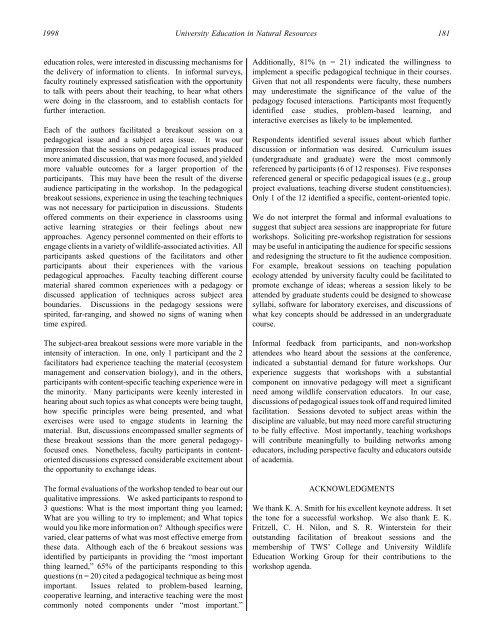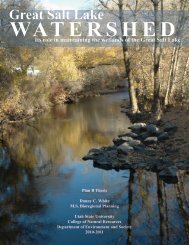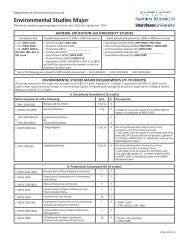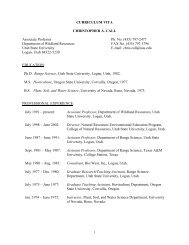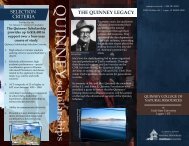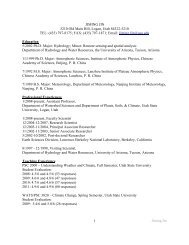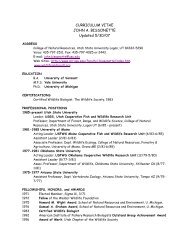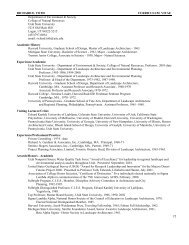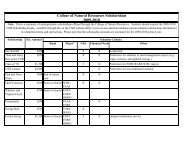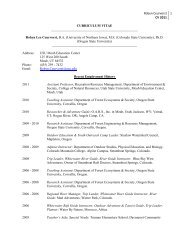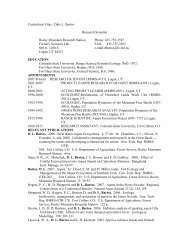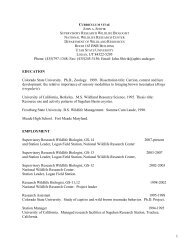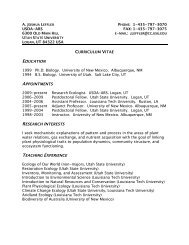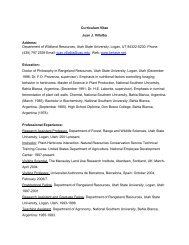University Education in Natural Resources - CNR Home - Utah State ...
University Education in Natural Resources - CNR Home - Utah State ...
University Education in Natural Resources - CNR Home - Utah State ...
Create successful ePaper yourself
Turn your PDF publications into a flip-book with our unique Google optimized e-Paper software.
1998<br />
<strong>University</strong> <strong>Education</strong> <strong>in</strong> <strong>Natural</strong> <strong>Resources</strong> 181<br />
education roles, were <strong>in</strong>terested <strong>in</strong> discuss<strong>in</strong>g mechanisms for<br />
the delivery of <strong>in</strong>formation to clients. In <strong>in</strong>formal surveys,<br />
faculty rout<strong>in</strong>ely expressed satisfication with the opportunity<br />
to talk with peers about their teach<strong>in</strong>g, to hear what others<br />
were do<strong>in</strong>g <strong>in</strong> the classroom, and to establish contacts for<br />
further <strong>in</strong>teraction.<br />
Each of the authors facilitated a breakout session on a<br />
pedagogical issue and a subject area issue. It was our<br />
impression that the sessions on pedagogical issues produced<br />
more animated discussion, that was more focused, and yielded<br />
more valuable outcomes for a larger proportion of the<br />
participants. This may have been the result of the diverse<br />
audience participat<strong>in</strong>g <strong>in</strong> the workshop. In the pedagogical<br />
breakout sessions, experience <strong>in</strong> us<strong>in</strong>g the teach<strong>in</strong>g techniques<br />
was not necessary for participation <strong>in</strong> discussions. Students<br />
offered comments on their experience <strong>in</strong> classrooms us<strong>in</strong>g<br />
active learn<strong>in</strong>g strategies or their feel<strong>in</strong>gs about new<br />
approaches. Agency personnel commented on their efforts to<br />
engage clients <strong>in</strong> a variety of wildlife-associated activities. All<br />
participants asked questions of the facilitators and other<br />
participants about their experiences with the various<br />
pedagogical approaches. Faculty teach<strong>in</strong>g different course<br />
material shared common experiences with a pedagogy or<br />
discussed application of techniques across subject area<br />
boundaries. Discussions <strong>in</strong> the pedagogy sessions were<br />
spirited, far-rang<strong>in</strong>g, and showed no signs of wan<strong>in</strong>g when<br />
time expired.<br />
The subject-area breakout sessions were more variable <strong>in</strong> the<br />
<strong>in</strong>tensity of <strong>in</strong>teraction. In one, only 1 participant and the 2<br />
facilitators had experience teach<strong>in</strong>g the material (ecosystem<br />
management and conservation biology), and <strong>in</strong> the others,<br />
participants with content-specific teach<strong>in</strong>g experience were <strong>in</strong><br />
the m<strong>in</strong>ority. Many participants were keenly <strong>in</strong>terested <strong>in</strong><br />
hear<strong>in</strong>g about such topics as what concepts were be<strong>in</strong>g taught,<br />
how specific pr<strong>in</strong>ciples were be<strong>in</strong>g presented, and what<br />
exercises were used to engage students <strong>in</strong> learn<strong>in</strong>g the<br />
material. But, discussions encompassed smaller segments of<br />
these breakout sessions than the more general pedagogyfocused<br />
ones. Nonetheless, faculty participants <strong>in</strong> contentoriented<br />
discussions expressed considerable excitement about<br />
the opportunity to exchange ideas.<br />
The formal evaluations of the workshop tended to bear out our<br />
qualitative impressions. We asked participants to respond to<br />
3 questions: What is the most important th<strong>in</strong>g you learned;<br />
What are you will<strong>in</strong>g to try to implement; and What topics<br />
would you like more <strong>in</strong>formation on? Although specifics were<br />
varied, clear patterns of what was most effective emerge from<br />
these data. Although each of the 6 breakout sessions was<br />
identified by participants <strong>in</strong> provid<strong>in</strong>g the “most important<br />
th<strong>in</strong>g learned,” 65% of the participants respond<strong>in</strong>g to this<br />
questions (n = 20) cited a pedagogical technique as be<strong>in</strong>g most<br />
important. Issues related to problem-based learn<strong>in</strong>g,<br />
cooperative learn<strong>in</strong>g, and <strong>in</strong>teractive teach<strong>in</strong>g were the most<br />
commonly noted components under “most important.”<br />
Additionally, 81% (n = 21) <strong>in</strong>dicated the will<strong>in</strong>gness to<br />
implement a specific pedagogical technique <strong>in</strong> their courses.<br />
Given that not all respondents were faculty, these numbers<br />
may underestimate the significance of the value of the<br />
pedagogy focused <strong>in</strong>teractions. Participants most frequently<br />
identified case studies, problem-based learn<strong>in</strong>g, and<br />
<strong>in</strong>teractive exercises as likely to be implemented.<br />
Respondents identified several issues about which further<br />
discussion or <strong>in</strong>formation was desired. Curriculum issues<br />
(undergraduate and graduate) were the most commonly<br />
referenced by participants (6 of 12 responses). Five responses<br />
referenced general or specific pedagogical issues (e.g., group<br />
project evaluations, teach<strong>in</strong>g diverse student constituencies).<br />
Only 1 of the 12 identified a specific, content-oriented topic.<br />
We do not <strong>in</strong>terpret the formal and <strong>in</strong>formal evaluations to<br />
suggest that subject area sessions are <strong>in</strong>appropriate for future<br />
workshops. Solicit<strong>in</strong>g pre-workshop registration for sessions<br />
may be useful <strong>in</strong> anticipat<strong>in</strong>g the audience for specific sessions<br />
and redesign<strong>in</strong>g the structure to fit the audience composition.<br />
For example, breakout sessions on teach<strong>in</strong>g population<br />
ecology attended by university faculty could be facilitated to<br />
promote exchange of ideas; whereas a session likely to be<br />
attended by graduate students could be designed to showcase<br />
syllabi, software for laboratory exercises, and discussions of<br />
what key concepts should be addressed <strong>in</strong> an undergraduate<br />
course.<br />
Informal feedback from participants, and non-workshop<br />
attendees who heard about the sessions at the conference,<br />
<strong>in</strong>dicated a substantial demand for future workshops. Our<br />
experience suggests that workshops with a substantial<br />
component on <strong>in</strong>novative pedagogy will meet a significant<br />
need among wildlife conservation educators. In our case,<br />
discussions of pedagogical issues took off and required limited<br />
facilitation. Sessions devoted to subject areas with<strong>in</strong> the<br />
discipl<strong>in</strong>e are valuable, but may need more careful structur<strong>in</strong>g<br />
to be fully effective. Most importantly, teach<strong>in</strong>g workshops<br />
will contribute mean<strong>in</strong>gfully to build<strong>in</strong>g networks among<br />
educators, <strong>in</strong>clud<strong>in</strong>g perspective faculty and educators outside<br />
of academia.<br />
ACKNOWLEDGMENTS<br />
We thank K. A. Smith for his excellent keynote address. It set<br />
the tone for a successful workshop. We also thank E. K.<br />
Fritzell, C. H. Nilon, and S. R. W<strong>in</strong>terste<strong>in</strong> for their<br />
outstand<strong>in</strong>g facilitation of breakout sessions and the<br />
membership of TWS’ College and <strong>University</strong> Wildlife<br />
<strong>Education</strong> Work<strong>in</strong>g Group for their contributions to the<br />
workshop agenda.


